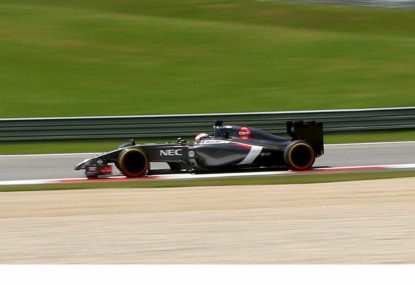Fernando Alonso's future is secure, now it's Lance Stroll's time to deliver for Aston Martin
It’s time that serious questions are asked of his Lance Stroll and his future in the team.

It has been branded the ‘nuclear option’ for Formula One’s commercial and governance structure, but Force India and Sauber showed no hesitation in pulling the trigger.
The weapon in question is a formal complaint to the European Commission on competition grounds with the intended outcome being a detailed investigation into the sport’s operation.
“Sahara Force India is one of two teams to have registered a complaint with the European Union questioning the governance of Formula One and showing that the system of dividing revenues and determining how Formula One’s rules are set is both unfair and unlawful,” said the Silverstone-based team in a statement.
It is the latest of many stresses loading the sport in a particularly brutal season in 2015, all of which are speeding to an unclear but almost certainly ugly climax.
Indeed, in the very week Force India and Sauber called time on their silences in the face of what they are alleging is discriminative business practice, Formula One finds itself on the brink of losing a borderline catastrophic six cars from its 22-car field in 2016.
History will also record that in September the sport was contemplating dropping the historic Italian Grand Prix at Monza from the 2017 calendar – a move that would equate to “ripping our hearts out”, as quadruple world champion Sebastian Vettel summed at this year’s event – and that Silverstone, home the sport’s other great classic in the British Grand Prix, is paying its race host fees one year in arrears because it can’t keep up with its standard contractual repayments.
And 2015 is the year during which there was no German Grand Prix, two teams had to run their 2014 cars for significant parts or the entirety of the season due to financial constraints, and one team was hauled before Victoria’s Supreme Court over a contract dispute while another frequented London’s High Court over unpaid taxes.
But this myriad of unseemly events should not be viewed as an escalation to a European Commission inquiry – this is par for Formula One’s course.
Formula One is sick. While the governing body, the commercial rights holder, and the teams bicker with each other and ultimately cancel themselves out – how are those 2017 regulations coming along? – the real world, the world in which the sport happens to operate, is passing it by.
This has a very real effect in the form of sponsorship drying up, television viewers switching off, and ace attendances dropping away.
Such problems hit weakest teams first, but the economy of any other competitive franchise has financial safety built into its backbone to ensure what wealth might be available – and despite its many problems, Formula One still accumulates massive wealth – is spread throughout its various organs to keep itself healthy.
Formula One lacks such a facility. Where other sports function by propping up its worst performers to push them back towards success – think the draft pick system in the AFL, as a basic example – in the last five years Formula One actively courted its best-heeled teams and cashed them up in exchange for the agreement to compete through to 2020.
Sure, sign-on bonuses are nothing special, but when the smallest teams – and in the case of Force India, Sauber, Lotus and Manor, all of which exist only for Formula One – are deprived of such money that might otherwise have been distributed via the prize pool, the structure starts to sting.
Most unfortunate of all is that there are no winners in this situation. Even the commercial rights holder is a loser, of sorts, in its own structure – guaranteeing the big teams was a way to boost the sport’s value ahead of an initial public offering it could never execute – and it is now burdened with a complicated asset for which it has no obvious endgame.
The FIA has been burnt. The teams have been burnt. Even Bernie Ecclestone, who has had a hand in the sport’s fortunes for longer than seems possible, has been burnt to some degree, having made deals for his employers that the sport has been unable to cash.
But most of all it is us who have been burnt. Fans pay more to watch at home, pay more to watch at the track, pay more to use the website, and pay more for merchandise, but all the while what we’ve been getting in return has decreased in value.
And so it is that two teams – two teams, I reiterate, that have existed for the sole purpose of racing in Formula One, each for almost 25 years – have decided their sport cannot continue down the path it is travelling.
The question now is whether the European Commission agrees with this assessment, and whether anything can be done to mend the sport before it hurtles beyond help.
But where to begin?
Follow Michael on Twitter @MichaelLamonato